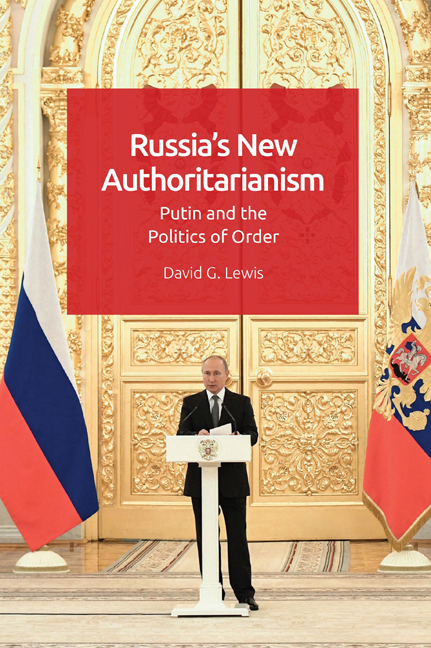Book contents
- Frontmatter
- Contents
- Preface
- Acknowledgements
- Note on Transliteration and Translation
- One Authoritarianism, Ideology and Order
- Two Carl Schmitt and Russian Conservatism
- Three Sovereignty and the Exception
- Four Democracy and the People
- Five Defining the Enemy
- Six Dualism, Exceptionality and the Rule of Law
- Seven The Crimean Exception
- Eight Großraum Thinking in Russian Foreign Policy
- Nine Apocalypse Delayed: Katechontic Thinking in Late Putinist Russia
- Conclusion
- Bibliography
- Index
Four - Democracy and the People
- Frontmatter
- Contents
- Preface
- Acknowledgements
- Note on Transliteration and Translation
- One Authoritarianism, Ideology and Order
- Two Carl Schmitt and Russian Conservatism
- Three Sovereignty and the Exception
- Four Democracy and the People
- Five Defining the Enemy
- Six Dualism, Exceptionality and the Rule of Law
- Seven The Crimean Exception
- Eight Großraum Thinking in Russian Foreign Policy
- Nine Apocalypse Delayed: Katechontic Thinking in Late Putinist Russia
- Conclusion
- Bibliography
- Index
Summary
Weakness and muddle-headedness do not amount to democracy.
Vladislav SurkovPutinism and Democracy
Early twenty-first-century Russia enjoyed all the institutions of modern democracy while gradually developing an increasingly authoritarian political system. This contradictory system suggested to many that Russia was a ‘hybrid regime’, in which authoritarian and democratic institutions co-existed (Hale 2010; Treisman 2011; Petrov et al. 2014), or an ‘electoral authoritarian’ regime, in which authoritarian leaders came to power through the ballot box, but governed as authoritarians (Schedler 2006). Yet Russia under Putin was neither a genuinely hybrid system nor a version of electoral authoritarianism, but a regime which combined an important role for popular opinion within a system comprising illiberal and authoritarian practices and institutions. Putinism was an authoritarian political system, which attempted to come to terms with the democratic spirit of the age, by representing the popular majority within the system, not through free elections, but through the assertion of a shared identity between the leader and the people.
Versions of this ‘democratic’ authoritarianism have become familiar across authoritarian polities, from Hungary's ‘illiberal democracy’ to China’s ‘populist authoritarianism’ (Tang 2016). Its primary characteristic was the levering apart of ‘liberal’ and ‘democracy’, rejecting liberal norms and institutions but retaining an important role for mass popular opinion in a majoritarian form of democracy. Vladislav Surkov had led Russian discussions on this different understanding of democracy through his idea of ‘Sovereign Democracy’. Many critics assumed that Surkov's model was a conceptual oxymoron, in which the assertion of sovereignty implied the negation of democracy (Prozorov 2009: 149). However, Surkov's slogan could also be read through Schmitt in a more productive way, defining a democracy not as a system of accountability and constraints on power, but as a ‘democratic identity of governed and governing’, in Schmitt's phrase (Schmitt 1985c: 14).
In Surkov's later vision of what he terms an ‘ideology’ of ‘Putinism’, outlined in a widely read article in 2019, the Russian people and the leader had formed an unmediated form of democracy, largely unconstrained by liberal principles of rule of law or parliamentary process. The people in this system plays a role as a kind of political sediment, which constrains the leader and acts as an inchoate veto-wielder over elite initiatives: the people ‘constrains the fantasies of theoreticians, and forces practitioners to take concrete steps’ (Surkov 2019).
- Type
- Chapter
- Information
- Russia's New AuthoritarianismPutin and the Politics of Order, pp. 81 - 99Publisher: Edinburgh University PressPrint publication year: 2020



